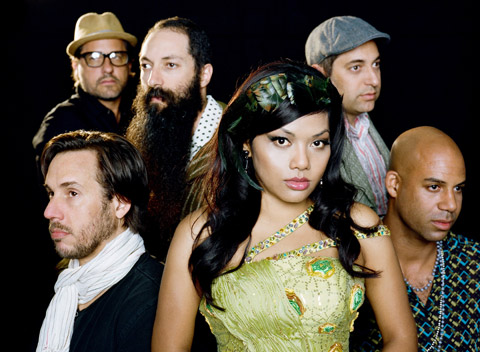
AURAL COURTSHIP Dengue Fever combine traditional Cambodian pop music with the psychedelic leanings of six people raised in California. |
For all the kitsch and B-movie flair of Dengue Fever, there are still a few aspects of their obsession with Cambodian pop that they haven't put on record. "They have these things there called 'sentimentals,' " says drummer Paul Smith over the phone from his home in Los Angeles. "Real slow love ballads. At the peak of the night at a club, when they've been playing up-tempo hip-hop, they'll throw on a sentimental. All the guys will put their arms around each other and they all stop and sing this slow ballad and the whole club just stops. It's hilarious." The group haven't yet worked this marvel of Cambodian culture into their own set, though we can always hope.
The Pacific Ocean is a pretty enormous buffer between the cultures of the Far East and the Old West, but as scads of Southeast Asian rock fans can tell you, that never got in the way of their record collections. Maybe it's the sly melodies or a strange form of post-colonial/Cold War nostalgia. Or maybe it's just those splashy, reverberated guitar invocations of the ocean that millions of people stare out at every day, thinking thoughts in hundreds of different languages.
Dengue Fever grew up on the beach, too — most of the group were born and raised in Los Angeles. "I think we're a product of the West Coast for sure," says Smith. "I grew up hanging around the beach. I didn't necessarily surf, but there is a kind of laid-back attitude, a kind of sense of adventure."
In this case, the adventure is building a career on the inspiration of a lost generation of a Cambodian psychedelic pop, a genre — born in the '60s in that distant nation on the other side of the Pacific — that mashes together a string of American pop, rock and roll, soul, and surf music with more traditional Cambodian vocals. They've just released their fourth full album, Cannibal Courtship (Fantasy /Concord) and are headed for a date with the Brighton Music Hall this Tuesday.
The band has grown up through a time of exploding interest in bizarro-world takes on rock from the remotest corners of the planet, egged on by a plethora of blogs and reissue labels. A smattering of old friends with diverse backgrounds in LA and the Bay area, they began with a handful of covers from tapes that keyboardist Ethan Holtzman had brought over from travels in Cambodia. Then they discovered the incredible singer Chhom Nimol at a club called the Dragon House in Long Beach.
Now, they're genuine ambassadors of the music, preserving the sound while simultaneously shaking things up. The documentary of their visit to Cambodia in 2005, Sleepwalking Through the Mekong, is a must-see, and last year's band-curated compilation of vintage Cambodian singles — Electric Cambodia (Minky) — is a defining document of the genre. Aside from drawing a strong contingent to their shows from various Cambodian communities around Boston, the group has worked closely with the Cambodian Living Arts group at Marion Institute in Marion in a series of Cambodian student music classes and workshops. Meanwhile, Nimol's English has grown more proficient, to the point where she's now singing about heat-seeking missiles and visits to her therapist and playing off campy sci-fi keyboard references with ease. The band has clearly outgrown the role of mimicking those old tapes.